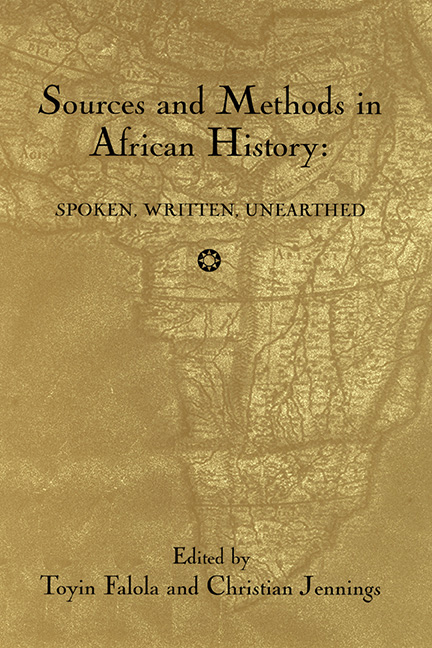Book contents
- Frontmatter
- Dedication
- Contents
- Acknowledgments
- Introduction
- Part I Archaeological Sources
- Part II Africa and the Atlantic World
- Part III Documentary Sources
- Part IV Oral Tradition
- 14 Section Introduction: Oral Tradition: Classic Questions, New Answers
- 15 Narratives on Pilgrimages to Mecca: Beauty versus History in Mande Oral Tradition
- 16 Kingship and the Mediators of the Past: Oral Tradition and Ritual Performance in Nupeland, Nigeria
- 17 Passages in a Struggle over the Past: Stories of Maji Maji in Njombe, Tanzania
- 18 Maisha: Life History and the History of Livelihood along the TAZARA Railway in Tanzania
- Part V Innovative Sources and Methods
- Contributors
- Index
15 - Narratives on Pilgrimages to Mecca: Beauty versus History in Mande Oral Tradition
from Part IV - Oral Tradition
Published online by Cambridge University Press: 25 October 2017
- Frontmatter
- Dedication
- Contents
- Acknowledgments
- Introduction
- Part I Archaeological Sources
- Part II Africa and the Atlantic World
- Part III Documentary Sources
- Part IV Oral Tradition
- 14 Section Introduction: Oral Tradition: Classic Questions, New Answers
- 15 Narratives on Pilgrimages to Mecca: Beauty versus History in Mande Oral Tradition
- 16 Kingship and the Mediators of the Past: Oral Tradition and Ritual Performance in Nupeland, Nigeria
- 17 Passages in a Struggle over the Past: Stories of Maji Maji in Njombe, Tanzania
- 18 Maisha: Life History and the History of Livelihood along the TAZARA Railway in Tanzania
- Part V Innovative Sources and Methods
- Contributors
- Index
Summary
The aesthetic fallacy selects beautiful facts, or facts that can be built into a beautiful story, rather than facts that are functional to the empirical problem at hand. It consists in an attempt to organize an empirical enquiry upon aesthetic criteria of significance, or conversely in an attempt to create an objet d'art by an empirical method. To do so is to confuse two different kinds of knowledge and truth. To the truth of art, external reality is irrelevant. Art creates its own reality, within which truth and the perfection of beauty is the infinite refinement of itself. History is very different. It is an empirical search for external truths, and for the best, most complete, and most profound external truths, in a maximal corresponding relationship with the absolute reality of the past events. Any attempt to conduct that search according to aesthetic standards of significance (most commonly in an attempt to tell a beautiful story) is either to abandon empiricism or to contradict it.
—D. H. Fischer, Historians’ Fallacies, 87Introduction: Mande Historical Imagination and Academic Historical Research
The figure of Nfa Jigin is featured in Mande oral traditions that relate the origin of the secret Komo initiation society to a pilgrimage to Mecca. In recent decades the time depth and the interpretation of Nfa Jigin traditions has been subject of systematic analysis, for instance by Sarah Brett-Smith and David Conrad, authors who have also published texts of new variants of the narrative. This article is a methodological exercise to investigate the external validity of their interpretations of Nfa Jigin narratives, and—as a consequence—the personage of Nfa Jigin “himself.” The interpretation of Nfa Jigin is an important issue in both West African historical imagination and academic historical research, since it is being suggested that—although authors emphasize at the same time that nineteenth- and twentieth-century additions, changes, and deletions continue to occur in the Nfa Jigin narratives—these narratives might represent the fusion of a core of information that is pre-fourteenth century with a set of post-1324 A.D. islamized tales. The date 1324 refers to the visit of Mansa Musa—the king of the Mali empire who was on pilgrimage—to Cairo, an event which has been reported in some fourteenth and fifteenth-century Arab sources (and probably the seventeenth-century Tarikh al-Fattash).
- Type
- Chapter
- Information
- Sources and Methods in African HistorySpoken Written Unearthed, pp. 249 - 267Publisher: Boydell & BrewerPrint publication year: 2003



